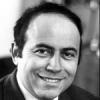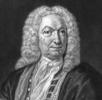
Eugene Fiume
Professor of Computer Science, Toronto.

Alain Fournier
Scientist and poet who contributed to computer graphics in the areas of stochastic modeling, illumination, light transport, and sampling and filtering.

Zvi Kedem
Professor of Computer Science, NYU.

Azaria Paz
Professor of Computer Science, Technion, Israel Institute of Technology.

Michael Rabin
Thomas J Watson, Sr. Professor of Computer Science at Harvard.

Alonzo Church
Fundamental contributor to theoretical computer science. Created lambda calculus, proved Church's Theorem that first order logic is undecidable, and proposed Church's Thesis (usually called the Church-Turing Thesis) that effective computation is equivalent to recursion.

Oswald Veblen
Once president of the American Mathematical Society, he is known for his work in topology, projective geometry, and differential geometry.

Eliakim Moore
Contributed to algebra and group theory, as well as algebraic geometry, number theory, and integral equations.

Hubert Newton
American scientist who was among the original members of the National Academy of Sciences. Contributed to pure mathematics, but his most important work was empirical and theoretical study of meteors.

Michel Chasles
French geometer and mathematical historian. Contributed to the development of synthetic geometry and introduced the notions of cross ratio, pencils, and involution.

Simeon Poisson
French mathematician who received little regard from his contemporary countrymen. Now famed for his work in a number of fields, including probability and differential equations.

Joseph Lagrange
Self-taught prodigy, later a protege of Euler. Made crucial contributions to the nascent calculus of variations, and contributed to dynamics, mechanics, differential equations, astronomy, probability, and number theory.

Leonhard Euler
Said to be the most prolific writer of mathematics of all time. The St. Petersberg Academy continued to publish unpublished work by Euler for fifty years after his death. Made fundamental discoveries in calculus (including the calculus of variations), mechanics, differential geometry, number theory, and complex analysis.

Johann Bernoulli
Swiss mathematician, among the first to explore calculus. His solution to the isoperimetric problem was foundational to the calculus of variations.

Jacob Bernoulli
Swiss mathematician who contributed to many areas, perhaps most notably to probability; we owe him the law of large numbers. He also made strong contributions to algebra, calculus, and mechanics.

Gottfried Leibniz
German philosopher, mathematician, and logician; held the aim of collecting all human knowledge. Made many contributions to mathematics, the most celebrated of which is his independent development of calculus.

Erhard Weigel
German mathematician, astronomer, and philosopher who believed that the number was the fundamental concept of the universe.